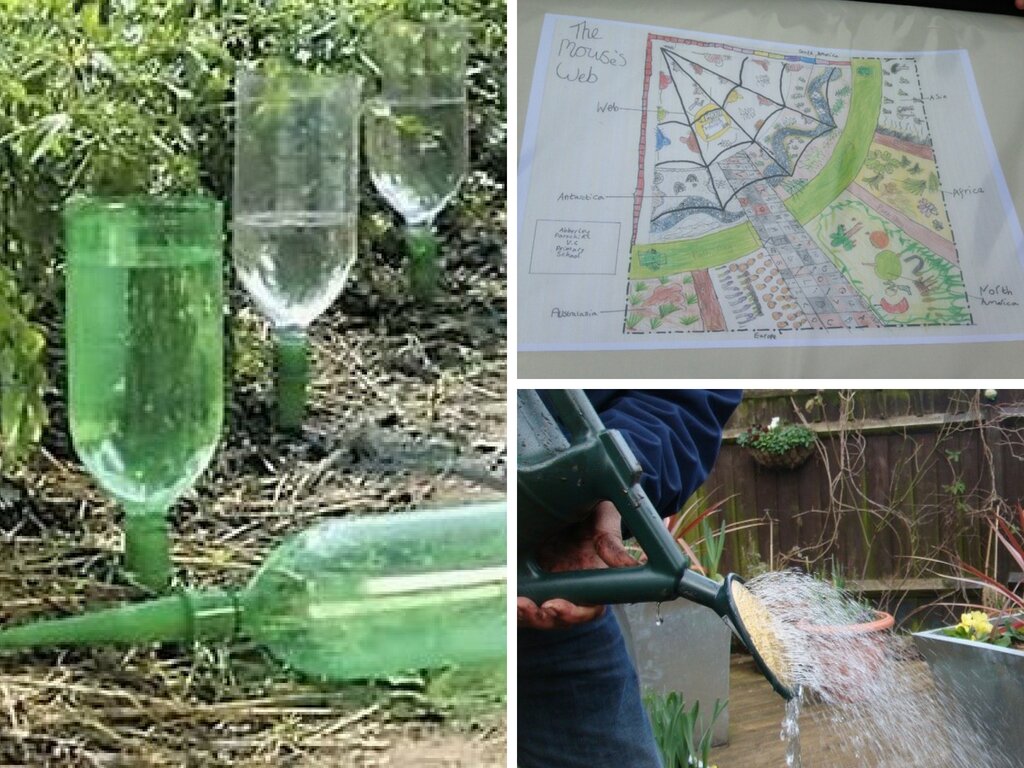Grow a School Garden – June/July 2018
Monthly blog by Chris Collins on How to Create and Grow a School Garden
Summer sun and watering advice
Well, the word at the moment is definitely sunshine and it really is beautiful weather. What a great time to be outside and enjoying all that nature offers!
It is though quite a tough time for plants and the dryness causes plants to feel stressed. This is not a problem as long as you’re doing your job as a gardener and seeing to their needs.
Watering of course is the job of such importance at the moment and it’s vital we get this job right.
First thing is – no hosepipes! Not because they are a banned, it’s just it’s not a good way to water in this heat. Water your plants by catering can and water to the base of your plants. Scorching can occur on the leaves if they get wet. Also spraying with a hose tends to just water the air as this heat soon soaks it up. You can use your hose, if you have one to fill your watering cans.
The other vital aspect of watering in this weather is the timing. Make sure the temperature is as cool as possible when watering your plants; early in the morning is the best time for a school.
Composting and weeding
Composting around your plants will also help keep those fine roots near the surface, especially the larger ones.
Remember also, to keep pulling those weeds, they will compete for water in this hot weather and many of then set their seeds much quicker in the hot weather.
Looking ahead – using curriculum activities
As the term comes to an end it’s also maybe a good time to think about what next for your garden area. You have your raised beds up and running so how about thinking about the design of the area.
A great Maths class is to measure your area and produce a scale drawing.
A great Art class is to sit down and design the garden, you could give a theme or think about connecting it to the school, its history or any stand out projects the school may have done.
This is great fun and a fantastic way to learn.
Harvesting your hard work
Hopefully you will now also be picking some of your crops. All your hard work will now mean you get to enjoy and maybe eat your produce. Remember when picking crops like Runner beans, to twist them first, so they snap cleanly from the plant. This avoids infection and fungus getting into the plant if it is damaged.
Similarly, when digging plants out, like Lettuce, remove the plant as cleanly as possible, don’t leave old leaves and refuse on the beds to encourage slugs and other problems.
How can parents, guardians and volunteers help?
However, the biggest challenge over the summer, is that schools break up.
How do we water the plants that have not been cropped? Hand watering is always best. Can you raise volunteers to help you with this?
Produce a newsletter with all your great work. Send it out to parents and grandparents to see if they would like to help and get involved.
Producing this newsletter would also make a great end of term project for the children and again could be tied in with the curriculum.
Another watering trick
There are some tricks you can use to help you with thirsty plants over the summer. We have already mentioned mulching and composting.
You can also use old plastic water bottles.
Remove the lid and fill the bottle with water. Then cover the mouth of the bottle with seven or eight layers of cling film, which then should be pierced with a sowing needle. Place upside down at the base of your plants and the water will slowly drain over a number of days, thus reducing your watering.
Well, I hope that helps and happy gardening and I wish you a great summer hols!
Chris Collins
Head of Organic Horticulture. Garden Organic























